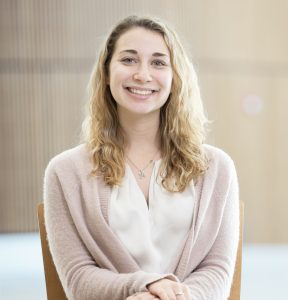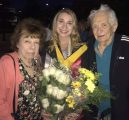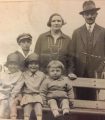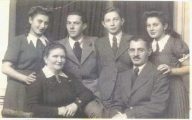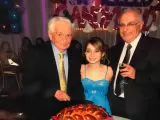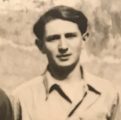MICHELLE WEINFELD INTERVIEW
Interviewer: Nancy Gorrell
Place: SSBJCCHEC Phone Interview
Date: August 2, 2023
Generational Trauma. What does that even mean? The thought looped around my head, gnawing at me as I tried to rationalize its implications…The word was deeply etched in my mind. Begging for understanding.
From Generation to Generation: A Memoir of Food, Family and Identity in the Aftermath of the Shoah by Michelle Weinfeld
Q: The overarching theme of your book is from generation to generation. Can you explain how you framed that theme?
A: The theme encompasses the good and the bad. My grandfather, "Poppy," taught me the good – the food and the recipes. But there is also the bad. The bad is passed along. I inherited some of the trauma as well. Researchers have been conducting studies assessing anxiety, depression and PTSD in Holocaust survivors and their descendants. They found that grandchildren of Holocaust survivors are more likely to be seen in psychiatric-care referrals than their peers without history of trauma.
Q: When or how did you make the connection between the Holocaust and generational trauma? Or, when or how did the realization come to you?
A: When I was at the University of Maryland, I had a depressive episode. My friend recommended I see a private therapist. I didn’t make the connection to the Holocaust at first.
Q: How long were you in therapy before you made that connection?
A: About six months.
Q: Did you discuss any of your realizations with Poppy?
A: No. Not with Poppy. I discussed it with my mom. My grandfather did not talk to my mom or aunt at all about his Holocaust experiences. He didn’t share his story until 50 years later when he had his first interview in 2009. I don’t know if my mom actually ever asked him about his past. I was compelled to ask him.
Q: Was the interview in 2009 a Shoah interview?
A: No, it was another interview. It was recorded. We still have it.
Q: How and when did you and Poppy begin talking about his Holocaust story?
A: When I was writing the book, I would go over to his house every Saturday and we would talk. The first time was during Covid. That was the first interview we had. Sometimes we would talk the whole day. I usually stayed for lunch. He was living in Monroe at the time and I was living in East Brunswick.
Q: Can you describe how you wrote the book?
A: I completed the first draft in about six months. My grandfather passed the very next day. My mother and I talked about that. He was 95 years old, and I guess he decided he had done everything he needed to do.
Q: Can you expand further on your writing process?
A: I wrote the book while taking a virtual program called “Creator Institute.” The program showed how to develop characters, organize chapters and develop themes. Today the virtual program is called “Manuscripts.”
Q: When and how did you make your personal connection to generational trauma as a descendant survivor?
A: Generational trauma made me take a step back to a recurring nightmare. It was usually fuzzy and vague but always started at night. I was hidden in a room or a closet inside a large building like a hotel. There were long hallways and someone was looking for me. I heard the people getting closer and closer. They walked quickly down the halls, knocked strongly on doors, and violently went through people’s room. I knew if I stayed where I was, they would find me. I started running down the hallways, slipping into other rooms. At some point I always ended up in the center area. It looked like a lobby and there were other people there. At this point it was rainy or misty and cold. Some people yelled while others were sobbing. I always saw a mother with her arms wrapped around her young daughter. Then the people were marched from the building with little or no belongings. Finally, I woke up. I never realized this was anything more than a nightmare.
Q: When did you realize this recurring nightmare was connected to the Holocaust?
A: When I told my friend, Rachel, about my dream. She automatically knew the men I was running from were Nazis, and the people hoarded in the center of the building and marched away were Jews.
Q: How did your encounters with anti-Semitism in your growing up years and in college contribute to your trauma?
A: In Hammarskjold Middle School pennies were thrown at my feet when I entered the lunchroom. “Jews like pennies,” the boys laughed. I did nothing. I knew no good would come from it. Everyone else thought it was completely harmless. I was 13 at the time and I began to have nights of intrusive thoughts about pennies clinging. In my college dorm, I also experienced anti-Semitism. It was so jarring to realize how pervasive it was and still is. It’s so ironic that we are having this interview now (Aug 3, 2023) because the Tree of Life murderer just got sentenced to death yesterday (Aug 2, 2023).
Q: You mention in your memoir after the killings in the Tree of Life Synagogue in Pittsburg in 2018, you no longer felt your temple a safe place to go. Can you expand on that realization.
A: Yes. The Tree of Life shooting shattered the image I had of my temple being a safe place to go. October 29, 2018, is a vivid day in my memory. Over the years police presence increased in my temple. This was the first time I realized what their constant presence meant…The shots fired in Pittsburg echoed through the halls of every synagogue in America. It is still not safe to be a Jew in America.
Q: What other encounters with anti-Semitism occurred in your college years?
A: In my junior year of college at the University of Maryland, my sorority was having a “highlighter party” with a fraternity that consisted of everyone wearing white T-shirts and walking around drawing on each other. This fraternity boy decided to draw a big, yellow swastika on my sorority sister’s T-shirt. She yelled at him and berated him. The boy left but then returned later to draw a swastika on another girl’s back. and She left in tears and another sorority sister reported the incident to the University the next day.
Q: What happened after the anti-Semitic incident?
A: The university conducted an investigation, and with witness testimony and evidence, the boy was removed from his fraternity.
Q: You mention in your book that you were not surprised by the incident.
A: Yes. This incident was not a surprising event for me. For years I sat at desks with swastikas engraved into them. The symbols of hate burned into my memory never left me, but was seen as a joke to so many others.
Q: Let’s turn for a moment to some happier memories. What was it like growing up with Poppy?
A: I was living in East Brunswick, NJ and Poppy and Grandma were living in Monroe close by. Poppy was an amazing grandparent—a dream grandparent. He was around all the time. He would stop by my house and bring me blueberries, my favorite fruit. Every time he came, he would leave a carton of blueberries for me. He was at every event I was in and he was so supportive when I went to college. When I graduated, I told him not to come because Maryland would be too far for him to come at his age. He said, “Michelle, I would crawl to get there.” Poppy was always there whenever you needed him. Not just for me, but for any member of his family. I was really lucky to have four incredible grandparents until I was 23 years old. My grandma is still alive today (Aug 2023). My grandfather on my dad’s side is still alive too.
